- Home
- Barry Unsworth
The Greeks Have a Word for It
The Greeks Have a Word for It Read online
THE GREEKS HAVE
A WORD FOR IT
BARRY UNSWORTH
THE GREEKS HAVE
A WORD FOR IT
1
At eleven o’clock in the morning the steamer entered the bay and made for the harbour. Kennedy and most of the other passengers came up on deck, to lean on the rail, acknowledge the fact of their arrival. Mrs Pouris didn’t though, and Kennedy thought this strange, after her patriotic sentiments during the voyage. Perhaps she had left her packing too late. One of the sailors began to attach strings of bunting to the mast, the Greek colours, white and blue. This was Piraeus then, the port of Athens; the usual installations, a few chimneys with industrial plumage, tawny hills beyond. He was glad to have arrived.
As the ship slowed, the breeze dropped and Kennedy felt a prickle of sweat on his upper lip. He had always been prone to sweating, and here, though still only the end of April, it was very hot. The sky, a pure blue earlier, had whitened and glazed in mid-morning and the water of the bay was the colour of oiled gunmetal. The ship’s wake was healed almost before foam showed.
‘Soon be on the old terra firma again,’ Kennedy remarked to several of the nearer passengers, none of whom quite looked at him and none of whom replied. He took out a handkerchief, somewhat discoloured, and wiped his mouth and palms. Then he walked forward a few paces, keeping near the rail, and stopped again on the covered part of the deck. From here he looked round once more for Mrs Pouris. Where could she have got to? She had not yet given him her address in Athens.
They were coming into their moorings now, to the accompaniment of much shouting from officers and crew, who continued to lack, in this final phase, the air of quiet authority which might, for an Englishman at least, have induced confidence in their management; contriving to look expert without suggesting competence. The sense of this, not however highly articulated, since most of Kennedy’s feelings remained in the undergrowth, the sense of potential disaster on the boat, had given him a certain pleasure throughout the voyage.
A small unshaven man in a white yachting cap jumped up and down on the quay, shouting. He made a gesture as if to ward the ship off. Kennedy had not had time to learn any Greek, but he observed with delight that a mistake had been made. There was a grinding noise as the ship scraped against the wall of the dock. That would cost more than his fare to put right, anyway. All breakdowns and untoward events, hitches in procedure, pleased him in some degree, aligning his personal irresponsibility with that of the cosmos.
A small group of people stood waiting below the ship, unmoving, gazing upwards, waiting to unload on the arriving voyagers their accumulated emotions. Around them swarmed those who might make money, conceivably: touts, pimps, porters, taxi-drivers, the agents for hotels. The gang-plank was down and the first passengers had begun to leave the ship. One or other group, the still or the mobile, would claim most of these, for whom landing meant a renewal of love or obligation. But not for him, Kennedy knew, with a faint, involuntary contempt. No one was going to profit in either way from his arrival. … Suddenly he saw Mrs Pouris getting off the ship. ‘Mrs Pouris!’ he called, smiling at her back, then again more loudly, ‘Mrs Pouris!’ But she did not look round, seemed in fact to accelerate. Surely she must have heard?
He glanced down over the side. The engines had stopped, water slapped against the hulk. He counted five oranges bobbing about in the dirty water. ‘Will passengers please leave the ship now,’ said a voice on the loudspeaker. Turning his head, Kennedy saw the pale young Greek standing alone at the rail quite close. He had been alone throughout the voyage. Kennedy had seen him occasionally in the bar and on deck, always alone, but had not spoken to him, concentrated as he had been on Mrs Pouris, whose eyes were the colour of raisins, who smelled of hot silk and lotions not immediately nameable. Each evening he had slipped through the barrier into the first-class section of the ship, to pace with Mrs Pouris up and down the deck. And now she had fled — there was no other word for it. She had received, perhaps, a warning, read a horoscope? Or, Kennedy wondered uneasily, perhaps he had not been sufficiently delicate in the insinuation of his poverty?
He had just decided to speak to the Greek when the latter glanced round at him and smiled, so there was a moment of what seemed recognition between them, something acknowledged in common. This was encouraging and Kennedy returned the smile promptly and on a larger scale. Perhaps something yet could be salvaged. His was a face constructed, it would seem, for smiling, broad, high cheek-boned, the wide mouth notched as it were for gradations of glee, curving up towards freckles and very round blue eyes. The eyes did not change much, whatever the degrees recorded below, and they had a lingering boldness of regard.
‘Bit of a crush down there,’ Kennedy said, hoping the other understood English. ‘Ce n’est pas encore possible de sortir,’ he added haltingly. A lot of them knew a bit of French. He had learned his as an army clerk at S.H.A.P.E. headquarters in Paris, before certain dealings had led to his dishonourable discharge. ‘No sense in going down there yet, c’est pas la peine …’
‘I understand English,’ the Greek said. He had a small oval face and very beautiful dark eyes. And he spoke English perfectly, without a trace of accent. One might just as well wait,’ he said. This linguistic accomplishment was unexpected, disconcerting, hinting at a familiarity with Kennedy’s countrymen, a faculty of assessment, that might be inconvenient. Kennedy paused, somewhat warily.
‘Just coming back from your holidays then?’ he said at last, in a congratulatory tone.
‘No, I have come for a visit. I am Greek, but I have been living in England for several years.’ He turned to look over the side again, at the passengers still descending. They were predominantly Greek. Speaking in loud tones, using their elbows freely, they jostled for precedence. It seemed to him that he remembered this fractiousness, this way of seeking in every occasion small personal triumphs. He was back among his people, many of whom were carrying huge Italian dolls wrapped in polythene.
‘That explains why you speak English so well,’ observed Kennedy, taking out his handkerchief. ‘It will be good to get on to terra firma again, won’t it?’ he added.
‘Les passagers sont priés …’ began the loudspeaker. Time was getting short.
‘Where are you staying?’ Kennedy asked. ‘Have you got somewhere to stay?’
‘Oh yes, I am going to live at my cousin’s house in Kifissia. That is near Athens, a suburb really.’
‘I’m not fixed up yet,’ Kennedy said, ‘I’m looking for a place to stay, just for a few days.’
‘There are some good hotels and not expensive, particularly in the neighbourhood of Omonia Square.’
‘To tell you the truth, old boy,’ Kennedy said, in a confidential manner, ‘I’m a bit short at the moment. Just for the next few days you know, till my money comes through. Even a cheap hotel …’
The other said nothing to this.
‘I thought from the first moment I saw you,’ Kennedy said, ‘that you were an understanding fellow. My name is Kennedy, by the way, Bryan Kennedy.’
‘Mitsos, Stavros Mitsos.’
‘Put it there,’ said Kennedy. He boosted his smile. ‘I’ve heard that the Greeks are a hospitable people,’ he said.
‘They are considered to be so,’ Mitsos replied. ‘I think it is time to be getting off the boat now,’ he added. He took a few steps towards the stairway leading to the lower deck.
‘Just a minute,’ Kennedy said, falling into step beside him. He hardly knew himself why he was thus persisting with such an obviously unpromising subject. It was not as though he were without immediate cash, even. But the flight of Mrs Pouris had inflamed his predatory instinct, he
was possessed by a vindictive desire to make a touch before he got off the boat. ‘I know you are a complete stranger,’ he said, ‘but I’ve got something here I’d like you to see.’ He fumbled in the inside pocket of his jacket and produced after a moment a frayed leather wallet. ‘I have several testimonials here,’ he said. ‘This one is from the Bishop of Jarrow, written in his own hand. Read it. I think you will be impressed.’
‘There is hardly time now,’ Mitsos said politely. He looked up at the pleasantly smiling face of the Englishman, striving as he did so to keep his impression general, preserve the other’s humanity, not succumb to the details of the features, the configuration of the nostrils, the large-pored skin, the shine of perspiration round the mouth. It had been increasingly difficult for him lately to spread his scrutiny over the whole area of anything without becoming helplessly impaled on the details. The man was very tall, well over six feet, and broad-shouldered. He had short untidy hair the colour of wet straw. His round blue eyes had a delinquent fixity of regard and his green tweed suit was too heavy, quite unsuitable for this weather. A man, on the whole, difficult to place. But no words or gestures he went in for now could redeem the gross haste with which he had revealed his needs to a stranger.
Mitsos left the rail and moved towards the head of the stairway. ‘They will be swilling the decks down,’ he said, ‘and they will swill us too, if we do not hurry.’ And in fact sailors had appeared with buckets of water. Reluctantly Kennedy restored the wallet to its place in his bosom and they descended the stairs together to collect their luggage from outside the purser’s office; Kennedy a single battered suitcase held together by a strap, and the Greek two rather sumptuous cream-coloured grips. He was a frail, small-boned person and had some difficulty in getting down the gang-plank with these. Kennedy did not offer to help. Immediately they were off the boat Mitsos began to look around for a taxi.
‘I was wondering,’ Kennedy said, without much hope, ‘whether you might lend me a small sum of money, to tide me over. Two or three pounds, say. Say three pounds. On the strength of that testimonial, which you are quite at liberty to read. I have several others from Justices of the Peace, Members of Parliament, and so on.’ His hand strayed towards his wallet. He had every confidence in the impact of these documents on any person who could be persuaded to read them, since he had written them himself, had expended, in fact, much labour on their composition. ‘Let me see,’ he said, ‘in drachmas that would be …’
Mitsos said, ‘I can’t lend you anything, I’m afraid. I am not carrying much ready money with me.’
‘I see, yes,’ Kennedy said. ‘Never mind, old boy. Just a thought.’
‘I’m sorry. You can come with me in the taxi to Athens, if that suits you.’
‘Really? No, but look here …’ Kennedy hoisted his suitcase, gave the dock a comprehensive survey in the hope of seeing even now some sign of Mrs Pouris. But they seemed to be the only passengers left.
A man detached himself from a group standing near the dock gates and approached them. ‘Oriste, kyrie?’ he said. ‘Taxi.’ He took their luggage and they followed him through the gates and out into the crowded street. Trolley wires netted the sky overhead and yellow trolley-buses trundled past continually. The glare of the sun on white buildings hurt Kennedy’s eyes and he was confused by the shouts of men selling peanuts and lottery tickets and by the loud conversations between passing pedestrians.
‘I’ve heard that word before, that word “kyrie”,’ he said. ‘In masses.’ He did not attend masses, but knew this word meant God, in whom he believed with a certain resentful clammine passed through his mind without any sense of impiety how marvellous it would be if he could have claimed divine authorship for one of his testimonials. ‘Noisy, isn’t it?’ he said.
‘Greeks like noise, generally speaking,’ Mitsos replied. ‘Though I do not, myself.’
The taxi-driver opened the door for them and his golden molars flashed. ‘Oriste,’ he said again.
‘Now I think I must discuss the price with him,’ Mitsos said.
Rapid Greek ensued. Kennedy stood by. His was a resilient and essentially optimistic nature. Now he declined to consider the wounding behaviour of Mrs Pouris and the lesser rebuff he had received from Mitsos, and he suddenly felt delighted to be here and grateful to the thin-necked person with the carrying voice, whose face he had not properly seen, who had put him on to Greece; grateful to the impulse that had lasted long enough to set him down here, listening to an argument about a taxi fare conducted in an unintelligible tongue.
In the Chelsea Potter it had all begun. He had been standing there with a Guinness on a crowded Friday, wondering who to ring up. He had felt rich but chastened, with over seventy pounds in his pockets, commission from selling encyclopaedias from door to door to American service families, a job for which he had shown aptitude but which he had lost two days before through smelling of drink and making fairly determined overtures to some of the wives — the one with whom he had been most successful had subsequently complained. And then this voice from further down the bar: ‘You want to go to Greece, old man. I would, if I were single. Marvellous climate, bloody marvellous, four thousand years of history. Four thousand bloody years of history. They’re all dying to learn English over there. They need it, you see, being a commercial nation. Anyone could go over there and get a good living. You only have to be English.’ Which Kennedy indubitably was. There and then, watching the froth on his Guinness subside, he had thought, why not? Scraps of myth had come into his mind, culled from his haphazard but abundant reading; garlanded heifers and raped nymphs, marble columns, angular e’s. He would go. He would be a tutor. Amazingly his resolve had held, long enough for him to write his testimonials, get his ticket, look at summer suits without buying one; long enough to steer him through the people who would have liked to help him spend what remained of the seventy pounds. What remained of it reposed at that moment in his hip pocket.
Negotiation ceased, and they got in. The taxi shot forward, narrowly missing a group of small crop-haired boys playing with pebbles in the gutter, and inserted itself into the stream of traffic. Down the long straight road to Athens small box-like houses were strung out, many of their walls bearing advertisements for macaroni or Fixe beer. For some time they skirted a glittering sea. Numerous sections of the road were under repair and thunderous with drills. Half-naked men toiled in the dust which swirled up under the wheels of cars and buses. The taxi-driver drove nonchalantly, at great speed, one hand only on the wheel, the other arm outstretched along the seat. From time to time he turned his head completely round to make some comment. Kennedy felt frightened, and to lessen this feeling did not look at the road ahead at all, but only out of his nearside window. For this reason he did not see the Parthenon till Mitsos told him to look, and whatever he had been expecting it was not this delicate railing of pillars suspended above the noon haze of the approaching city, too remote to be quite believed in as a structure. Not that Kennedy had given much thought to the Parthenon beforehand; he was not much interested in monuments, but he decided now on a demonstration, possibly flattering to Mitsos, from whom he still had some small hopes of gain.
He said, ‘I’ve read a lot about it, of course, but …’ craning his head forward to look again. Mitsos watched him curiously. His pleasure and interest seemed genuine. Now he had slumped right down in his seat, twisting his large head to get a better view. No Greek would willingly have adopted so ungainly an attitude. Mitsos had never understood this physical carelessness of the English. His own body insisted on graceful reclinations. And what was this greed for an alien past?
The taxi proceeded more slowly now, among the thicker traffic of the city. They came out into Omonia Square. The fountains were playing there and the pavements were crowded. They went round the outer rim of the hub, selected finally the spoke of Stadion Street. Mitsos looked out of the window at rows of tall hoardings concealing, it seemed, areas of demolition. What had been there he cou
ld not now remember, though he struggled to do so, and this small failure caused him something like despair. Every lapse of memory or recognition seemed to threaten the purpose of his return, formed suddenly after so many years, his desire to readopt the city.
‘Where can I put you down?’ he asked.
Kennedy had been experiencing some disillusionment, travelling down this spacious but quite ordinary avenue with its shops and cinemas and restaurants. Though what he had been expecting he could not say. He glared sideways at Mitsos’ watch, conveniently exposed just now. Twelve-fifteen nearly. An awkward time. He felt thirsty. From the top pocket of his jacket he took a folded piece of paper. ‘This is where I want to go,’ he said, passing the paper to Mitsos. The address of the Cultural Centre was the only one of any use he had in Athens and he had made up his mind to go there first of all.
‘Ah, yes,’ Mitsos said. ‘That will be quite easy. The taxi will go up Vassilis Sofias. We can put you down quite close. A few minutes’ walk.’
‘Splendid,’ Kennedy said. ‘Perhaps I can give you a ring in a day or two? I don’t know anybody here.’
‘Athens is like a village, in some ways. We shall be sure to meet.’
‘Yes, but if I had your phone number …’
‘Here we are,’ Mitsos said. ‘This is where you must get out.’ He spoke to the taxi-driver and the taxi drew into the kerb and stopped. Kennedy disentangled his long legs from below the front seat and seized his suitcase.
‘Thanks again, old boy,’ Kennedy said. ‘We shall be seeing some more of each other, I daresay.’
‘I hope so. That is your way up, through there.’
Kennedy scrambled out and then leaned back into the taxi, extending his hand. They shook hands solemnly. Looking back as the taxi gathered speed again, Mitsos saw the Englishman standing tall and irresolute, holding his suitcase, his unseasonable green tweed suit patterned with the shadows cast by one of the acacias that lined the avenue. So much for that. He wondered about Kennedy for a few moments, then he forgot him completely. He stared out of the taxi window, rigidly holding off the sense of unreality that threatened to descend on him in the absence of familiar landmarks. I am coming home, he told himself.

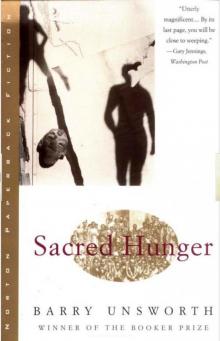 Sacred Hunger
Sacred Hunger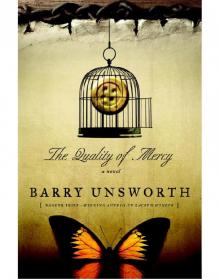 The Quality of Mercy: A Novel
The Quality of Mercy: A Novel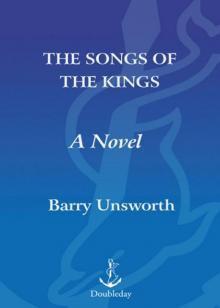 The Songs of the Kings: A Novel
The Songs of the Kings: A Novel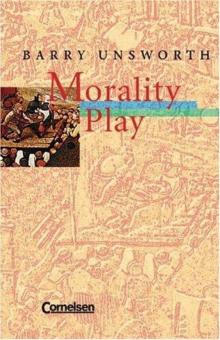 Morality Play. Mit Materialien. (Lernmaterialien)
Morality Play. Mit Materialien. (Lernmaterialien)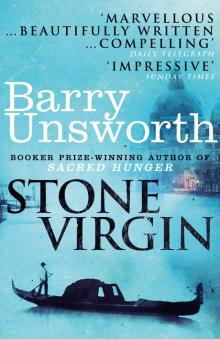 Stone Virgin
Stone Virgin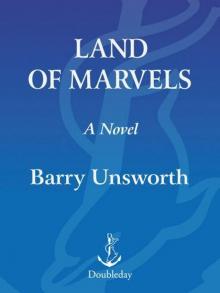 Land of Marvels
Land of Marvels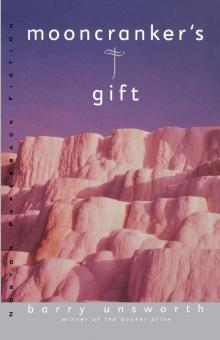 Mooncranker's Gift
Mooncranker's Gift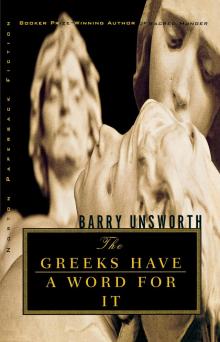 The Greeks Have a Word for It
The Greeks Have a Word for It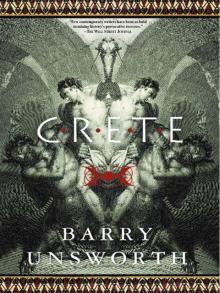 Crete
Crete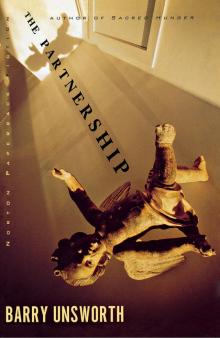 The Partnership
The Partnership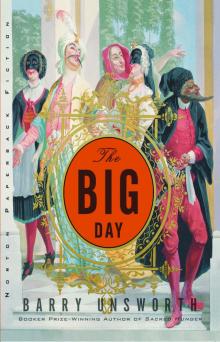 The Big Day
The Big Day The Hide
The Hide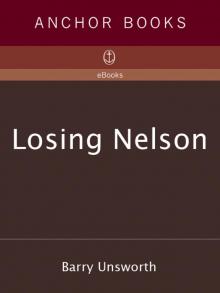 Losing Nelson
Losing Nelson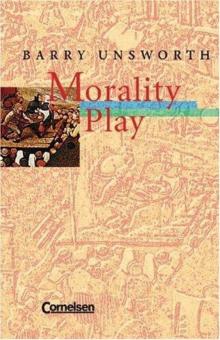 Morality Play
Morality Play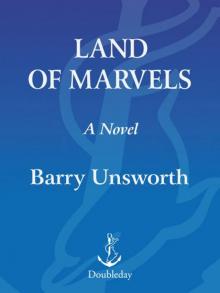 Land of Marvels: A Novel
Land of Marvels: A Novel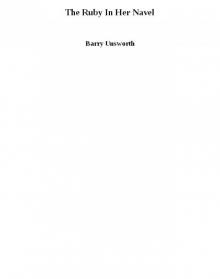 The Ruby In Her Navel
The Ruby In Her Navel